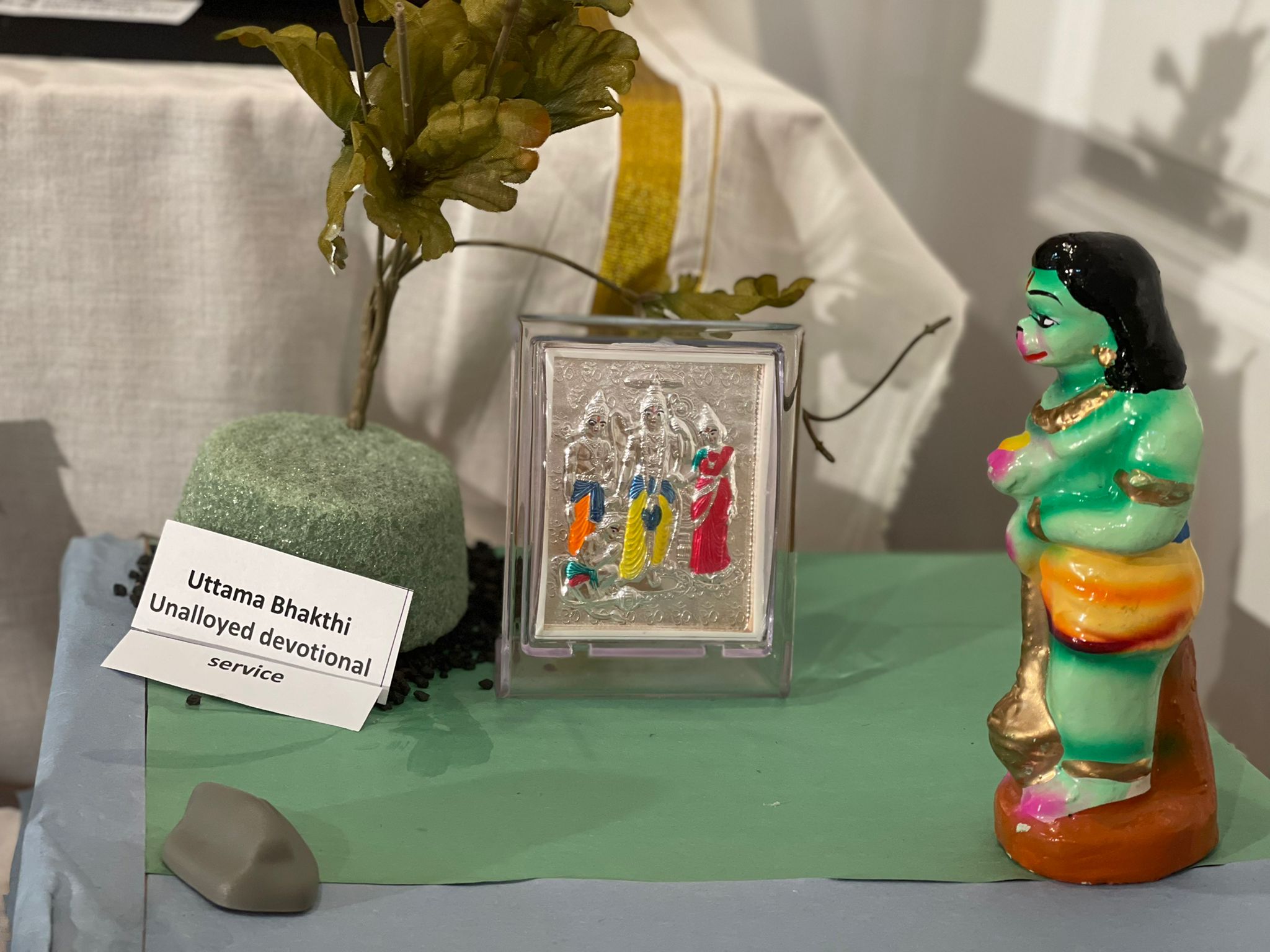Nine Personal Virtues
Nava Gunas
‘Nava’ means nine, and ‘Gunas’ means Virtuess , Nava Gunas stands for nine personal virtues which need to be practiced for attaining freedom from the cycle of birth and death.
The Nava atma Gunas are
- Daya or love and compassion for all beings,
- Kṣanti or forbearance,
- Anasuya or absence / freedom from envy,
- Sauca or purity of body, thought and action,
- Anayasa or absence of painful exertions that arise due to ambition and greed,
- Mangala or possessing cheerfulness, lightness and auspiciousness,
- Akarpanya or being generous and dignified and not demeaning oneself,
- Asprha or absence of clamoring after undesirable things.
- Uttama Bhakthi or unalloyed devotional service.
We have depicted symbols, stories and characters from Hindu mythology and scriptures to explain the concept of Nava Gunas.
Daya - Love and compassion for all beings
Story of Sibi Chakravarthy and Dove
Once upon a time there was a King named Sibi. He was very generous and just. If anybody approached the king for any help, he would never return disappointed. King Sibi would always take care of the needs of all his subjects.
Once a dovecame to King Sibi’s court. It was trembling with fear. The king lovingly held it in his hands. Just then, a hawk flew towards King Sibi and said, “O king, return my prey to me.” However King Sibi refused and said, “This dove has taken refuge with me. If I return it to you, you will eat it and I shall acquire sin.”
The hawk said, “I am hungry and this dove is my food. If you snatch away my food from me, I shall die of starvation. Won’t you acquire sin then?” King Sibi replied, “No, that is not my intention. You ask for any other food and I shall give it to you. The hawk said, “I eat meat. You give me your flesh, equal in weight to that of the dove.”
To the shock of everyone present King Sibi readily agreed. He ordered his men to get a weighing scale. The pigeon was kept on one side of the weighing scale and Sibi placed a piece of flesh from his thigh on the other. To everyone’s surprise, no matter how much flesh was cut from the king’s body and kept in the scale, it still could not outweigh the dove. Finally, King Sibi himself sat on the scale.
Suddenly, the pigeon and the hawk vanished and in their place stood Agnidevata (The Deity of Fire) and Deity Indra. They both blessed King Sibi and said, “O King. We had come here to test you. You really are very kind and just.” They restored his body and left the palace.
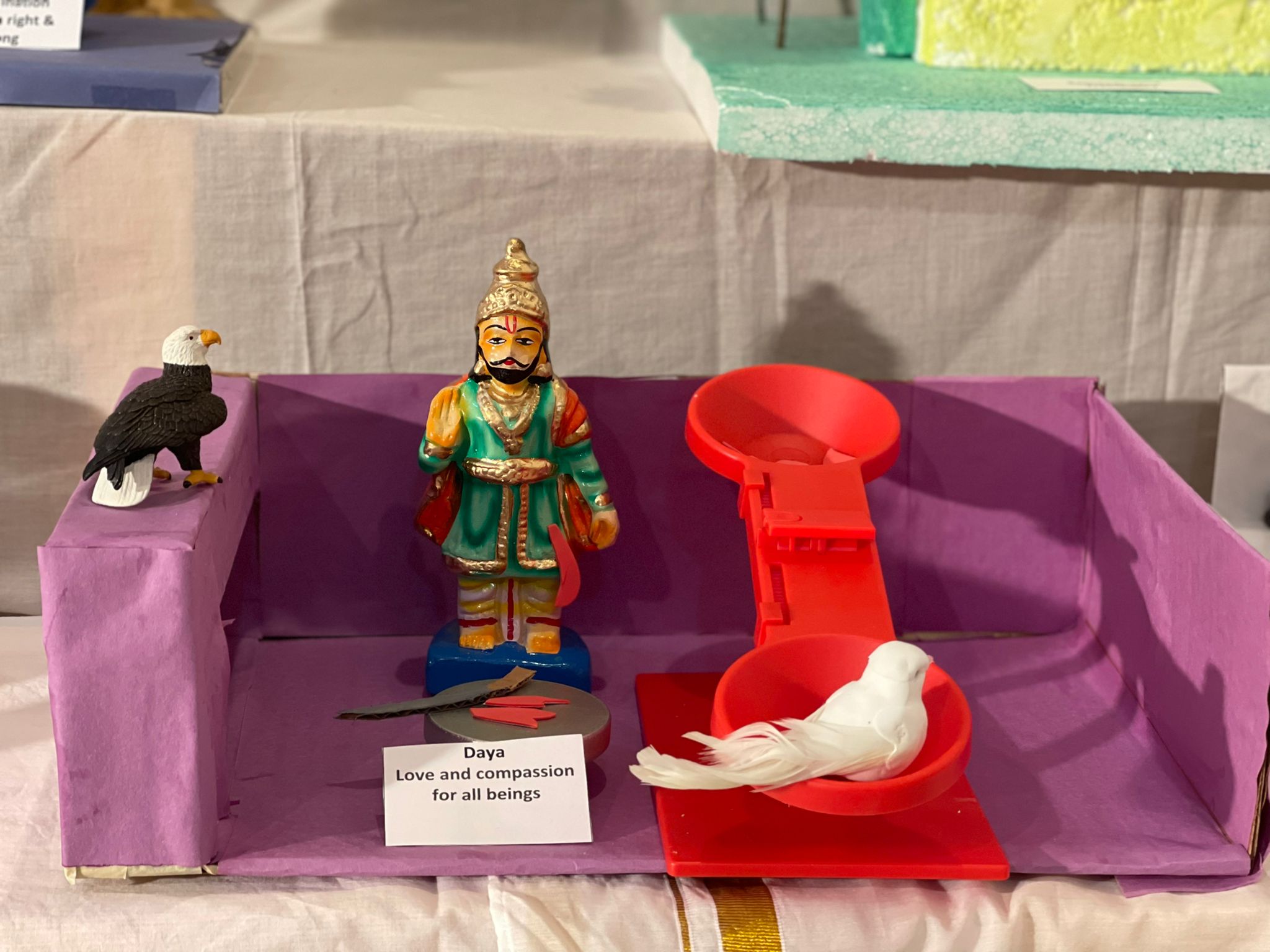
Ksanthi - Patience
Story of Jambavan
Jambavan was very experienced and intelligent. He had a good knowledge of running a kingdom. He was the one among Sugriva’s advisers. Jambavan advised King Sugriva to send Hanuman to identify Ram and Lakshman, to find out who they were and what their purpose was. Jambavan helped Ram to find his Goddess Sita and fight her abductor, Ravana. He was instrumental in making Hanuman realize his immense capabilities and encouraged him to fly across the ocean to search for Sita.
Jambavan mentions two past incidents of his life in the Ramayana. Once at the foot of Mount Mahendra, where Hanuman was about to leap, Jambavan told him that he too could have jumped over the ocean to Lanka. But he got injured when he was beating the drum for Lord Vishnu during the Vamana incarnation when Lord Vishnu measured the three worlds, his shoulder struck Jambavan, and he got injured which limited his mobility.
During the Samudra-Manthan, where he was also present at the event. He got to know about the disease-curing plant Vishalyakarni from the gods. Later, he used this information and conveyed it to Hanuman to help an injured Laxmana who was rendered unconscious by Indrajit.
During a duel with Ravana, Jambavan gave Ravana powerful punches with his hands and finally kicked him on his chest, knocking Ravana unconscious and making him fall in his chariot. As a result, the charioteer withdrew Ravana from the battle.
In the Mahabharat, Jambavan had killed a lion, who had acquired a gem called Syamantaka from Prasena after slaying him. Lord Krishna followed Jambavan to his cave, and a fight ensued. After eighteen days, realizing who Krishna was, Jambavan gave the gem to Lord Krishna and also married off his daughter Jambavati to him, who became one of Krishna’s wives.
Jambavan is a symbol of patience and utmost devotion.
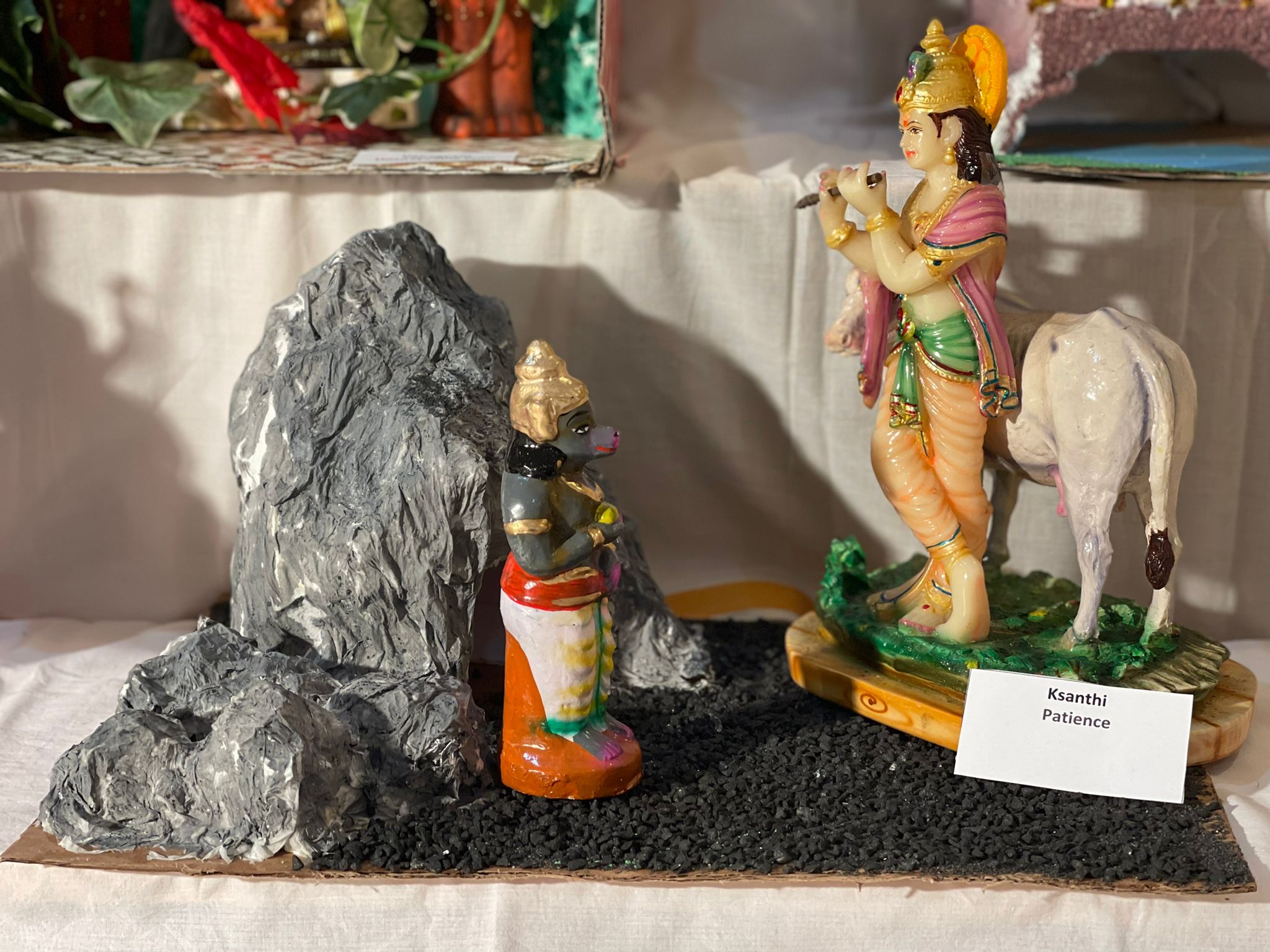
Anasuya - free from jealousy
Story of Narada and Tumburu
Narada was a god-sage considered a saktyavesa-avatar or partial-manifestation (avatar) of God, empowered to perform miraculous tasks on Vishnu’s behalf. Bhagavatha Purana details him as the primary source of information among Gods.He is believed to be the first journalist on Earth.
Tumburu is an amazing singer and sometimes described as the best of singers in Hindu mythology. He is described as the son of sage Kashyapa and his wife Pradha.
Once Narada and Tumburu went to Vaikuntha (the abode of Lord Vishnu). Tumburu sang in front of the lord Vishnu. Lord became pleased and gifted precious ornaments to Tumburu. Narada, the prime devotee of Lord Vishnu became jealous of Tumburu.
Out of the jealousy, he decided to please Lord Vishnu by his singing. Narada’s voice was not very good. He learnt how to sing and sang in front of the Lord Vishnu but Lord didn’t feel that joy in His heart by Narada’s singing. Narada performed hard devout to please Lord Shiva and asked a boon to become an expert singer. Pleased with Narada’s penance Shiva granted him the boon. Narada again went to Lord Vishnu and sang but his singing could not satisfy the Lord. Narada worked very hard for thousand of years. But his singing couldn’t please Lord Vishnu.
Ultimately, thinking beyond the jealousy, Narada went to Tumburu and asked to teach him how to sing. Tumburu taught him. Narada then sang in front of Lord Vishnu in Dwarka. Lord became extremely pleased and gifted him clothes and ornaments as rewards.
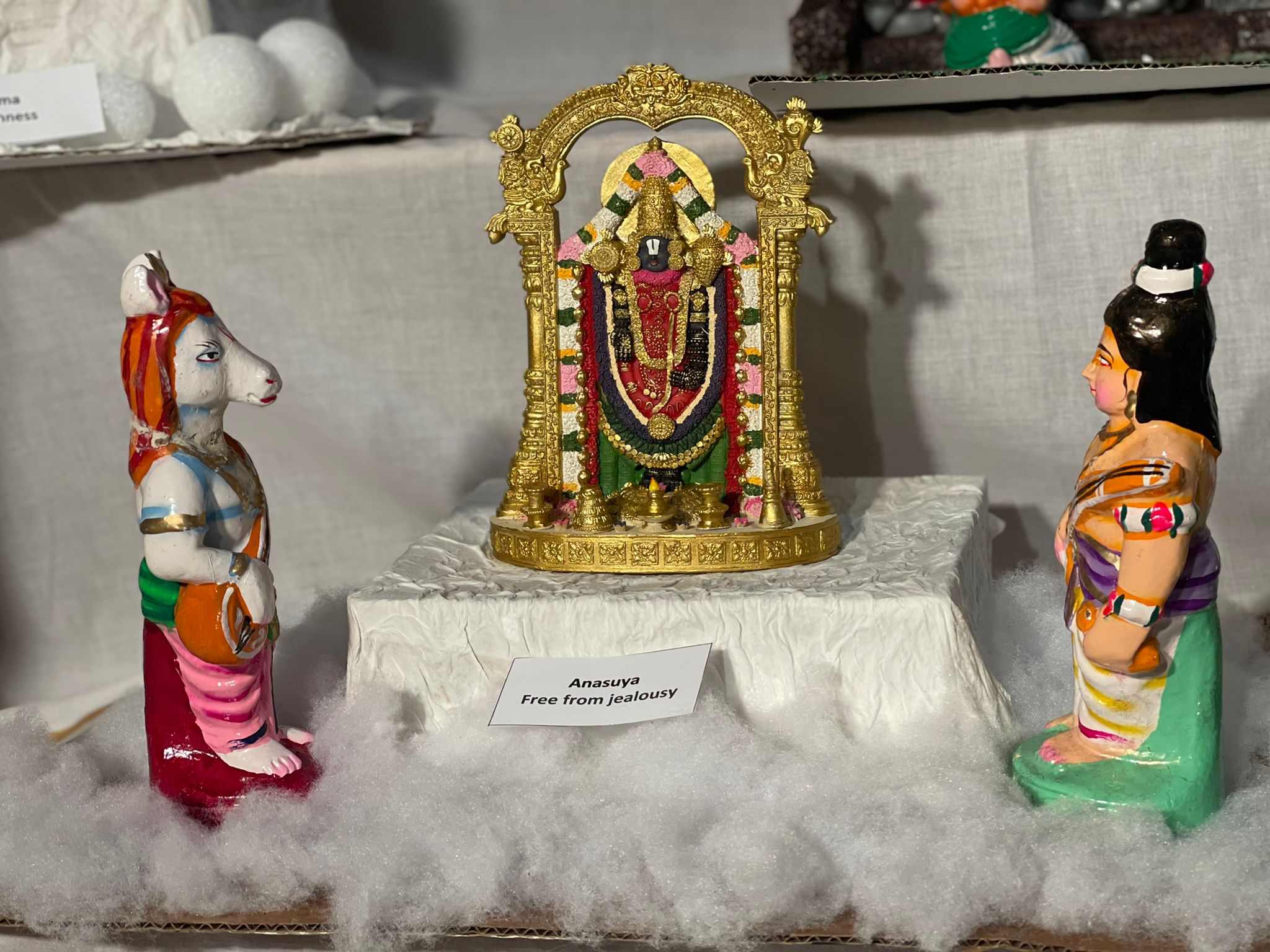
Sauca - Cleanliness. Purity
Story of Lakshmi
Goddess Lakshmi is the goddess of wealth, fortune and prosperity. She is the “eternal” consort and shakti (energy) of God Vishnu.
Lakshmi’s name comes from the Sanskrit word laksya, meaning an aim or goal. She is the goddess of wealth and prosperity, both material and spiritual. Lakshmi is depicted as a four-armed woman of golden complexion, holding a lotus bud as she sits or stands upon a massive lotus blossom. The deity of beauty, purity, and domesticity, the image of Lakshmi is often found in the homes of the faithful.
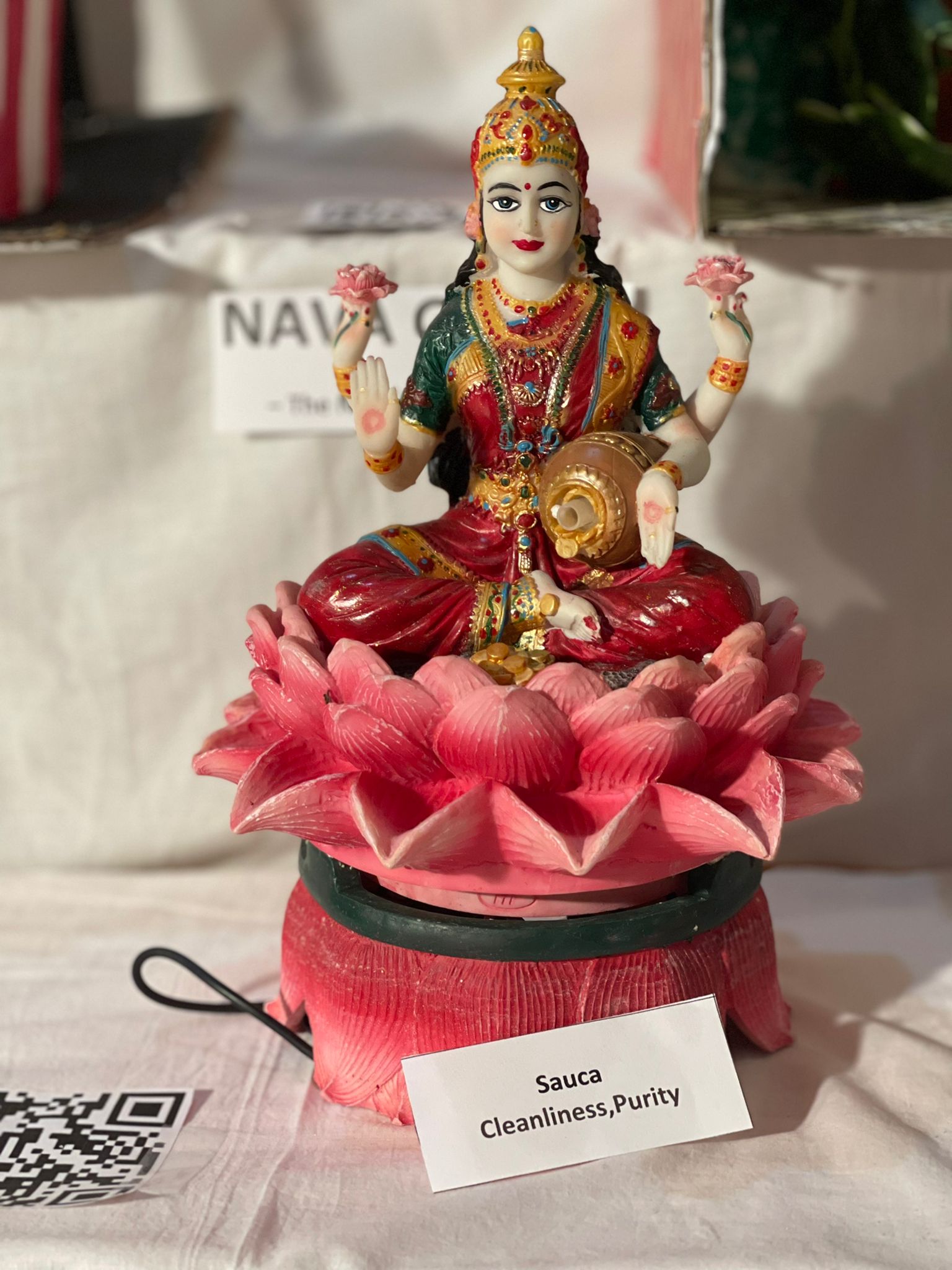
Anayasa - Feeling of lightness, to take things easy.
Story of Ganesha and Veda Vyasa
Sage Veda Vyasa wanted to recite Mahabharata and was looking for a disciple to write the text while he narrated. Veda Vyasa approached Lord Ganesha for help, and he agreed to write it.
Veda Vyasa had a condition that the story should be written in one go without any pause. Lord Ganesha agreed. However, while writing the Mahabharata, the quill with which Lord Ganesha was writing broke. There was no time to get a new quill as the story had to be written in one sitting.
Lord Ganesha did some quick thinking, broke one of his tusks, and used its sharp end to write the remainder of the story.
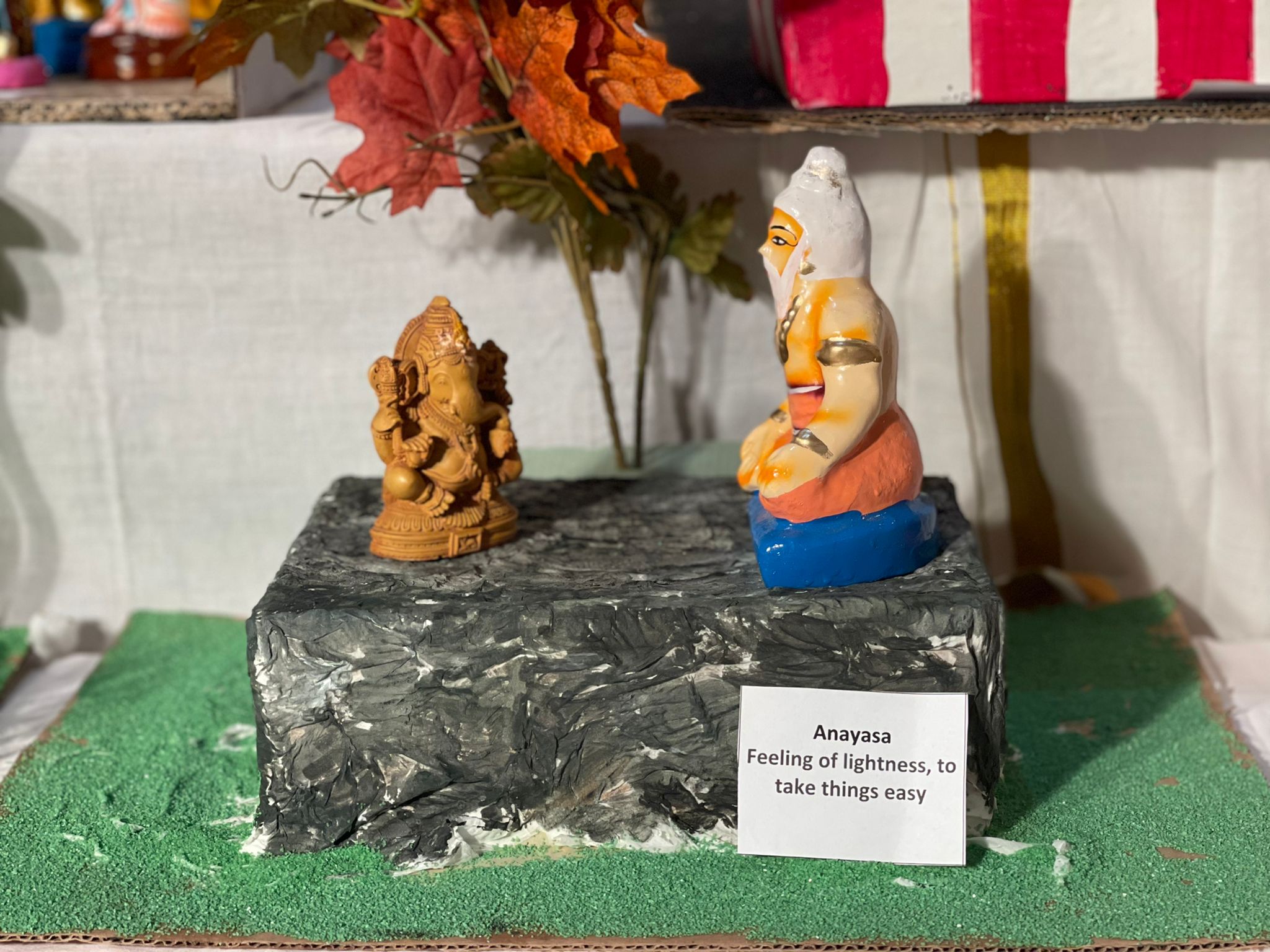
Mangala - Auspicious air about happiness that is characterized by dignity and purity
Story of Donkey and Horse
Once a donkey was walking in a forest. The donkey was searching for something.
A horse came in the opposite direction and noticed that the donkey was searching for something.
The horse approached the donkey and asked ” Hey, you look worried. Are you searching for something?”
The donkey replied ” Yes. I am searching for happiness.” The horse was taken aback, as he was also searching for the same.
“Hey, I am also searching for my happiness. Why don’t you join me in the search?”
Both the horse and the donkey started searching for happiness.
On the way they saw a Cuckoo bird singing. The donkey felt happy and said ” Happiness is singing.”
The horse said,” Brother Donkey, don’t come to a conclusion so soon. Let’s walk further.”
They walked further and found a tiger eating it’s food. The donkey exclaimed, ” Hurrah! Happiness is enjoying your food alone.” The Horse interrupted, ” Let’s walk further.”
They walked further. On the way, the found a kid crying for help.
They approached the kid, ” Why are you crying? What happened?”
“I lost my way and I am searching for my mum. I couldn’t find her.”
The horse and the donkey decided to search for the mother goat. After searching for sometime, they found the mother who was also searching for her kid. The mother goat and the kid were really happy seeing each other.
The horse and the donkey were really happy helping the kid search for its mother.
The donkey finally exclaimed” I know where the real happiness lies. It lies in helping others.” The animals understood the real meaning of happiness.
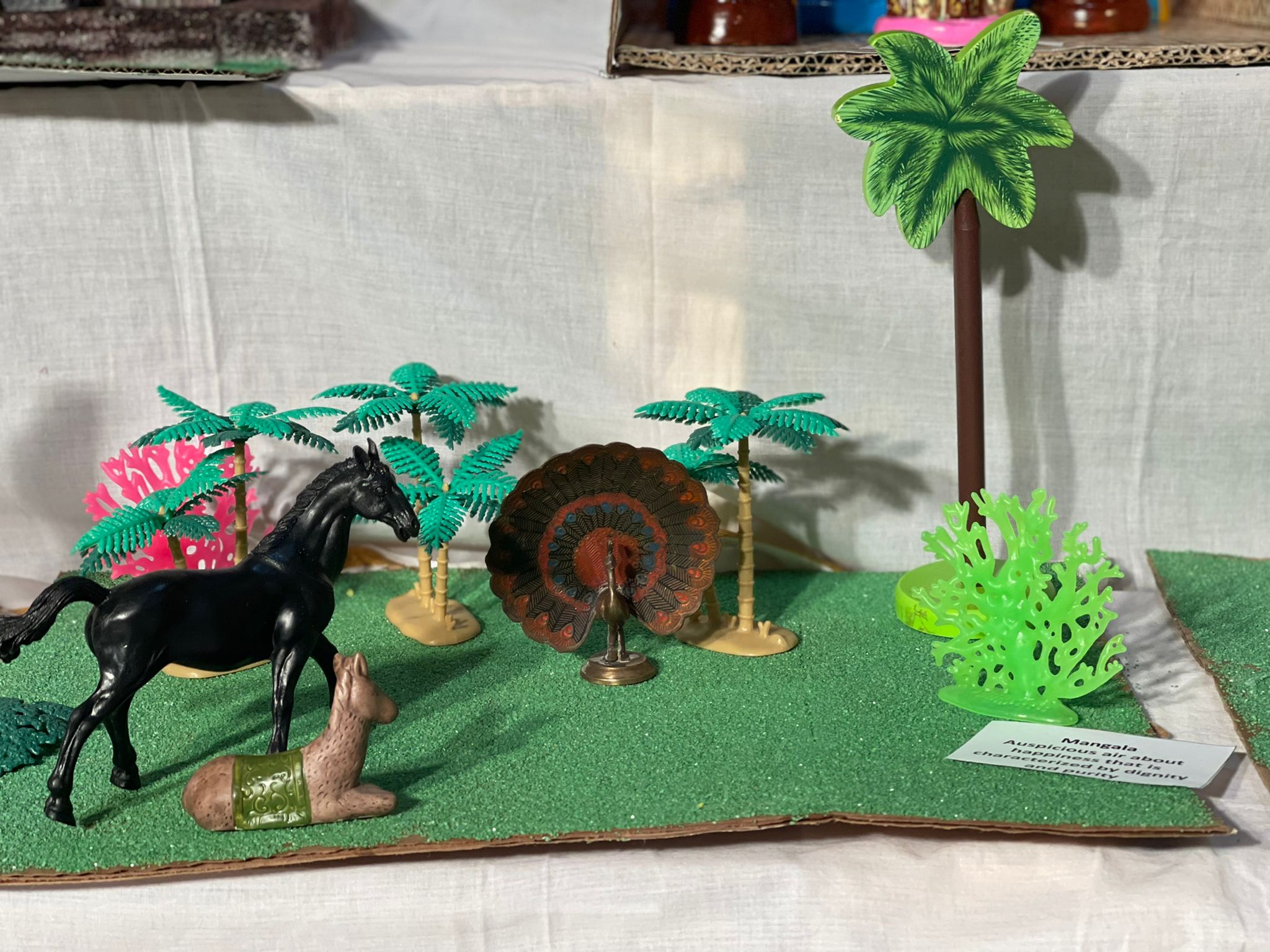
Akarpanya – Generosity
Story of Karna and Golden Mountain
Once Arjuna asked Krishna, why Karna should be considered an unparallelled Donor & not him ?
Krishna, turned two mountains into gold.
Then said, “Arjuna, distribute these two gold mountains among villagers, but you must donate every bit of it “.
Arjuna went into the village, and proclaimed he was going to donate gold to every villager, and asked them to gather near the mountain. The villagers sang his praises and Arjuna walked towards the mountains with a huffed up chest.
For two days and two nights Arjuna shoveled gold from the mountain and donated to each villager. The mountains did not diminish in the slightest.
Most villagers came back and stood in queue within minutes. Now Arjuna was exhausted, but not ready to let go of his Ego, told Krishna he couldn’t go on any longer without rest.
Then Krishna called Karna and told him to donate every bit of the two gold mountains.
Karna called the villagers, and said “Those two Gold mountains are yours. ” and walked away.
Arjuna sat dumbfounded. Why hadn’t this thought occurred to him?
Krishna smiled mischievously and told him “Arjuna, subconsciously, you were attracted to the gold, you regretfully gave it away to each villager, giving them what you thought was a generous amount. Thus the size of your donation to each villager depended only on your imagination.
Karna holds no such reservations. Look at him walking away after giving away a fortune, he doesn’t expect people to sing his praises, he doesn’t even care if people talk good or bad about him behind his back. That is the sign of a man already on the path of enlightenment”.
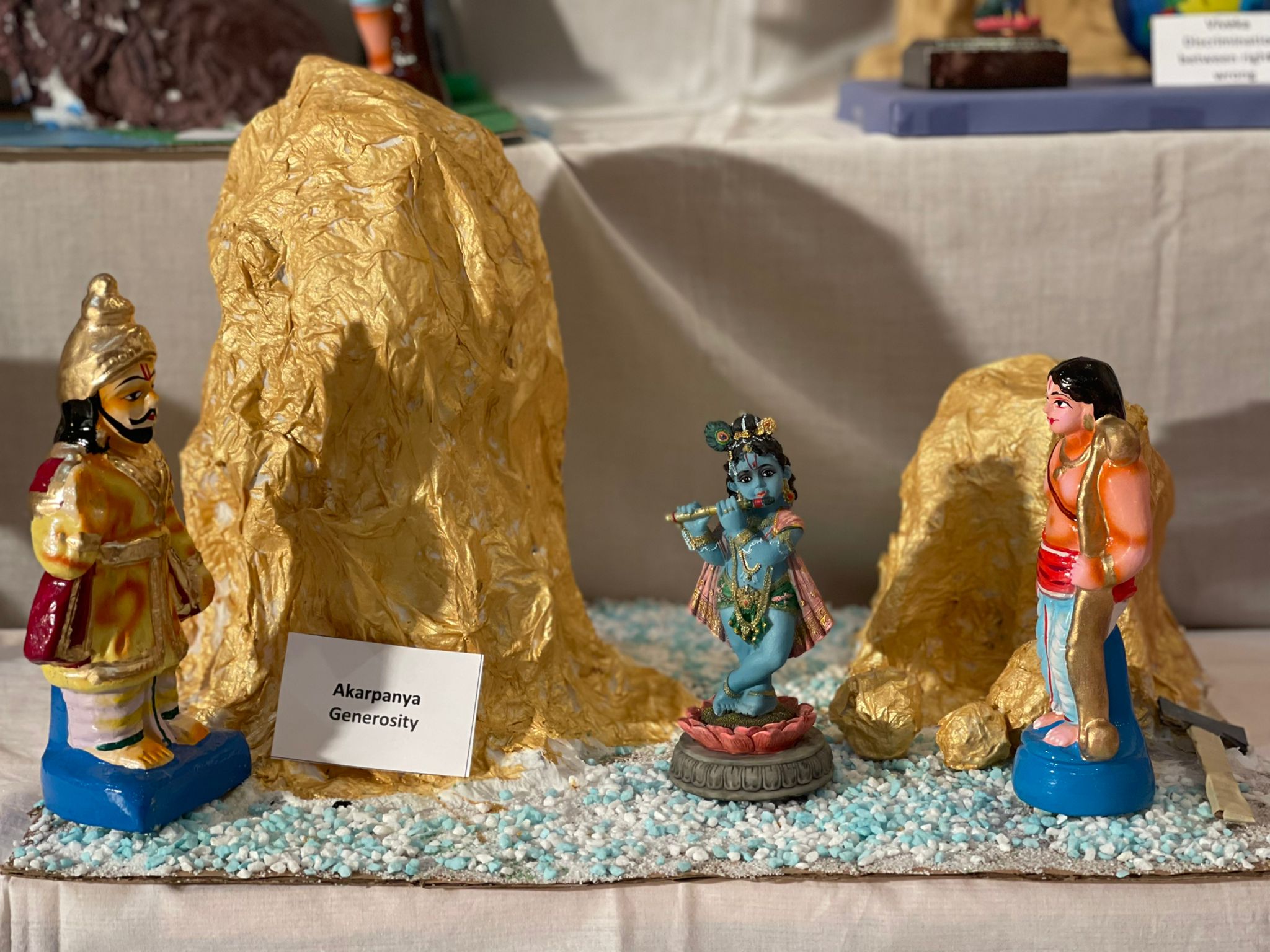
Asprha - Being without desire
Story of Shiva and Kirtimukha
A powerful asura king called Jalandara had a desire. He wanted to possess Parvati, the concert of Shiva.
The furious Shiva created a terrible being from his third eye. The terrible being had a face of a lion, a protruding tongue, eyes burning with fire, raised hair and roared like a lion.
This terrible being had a great desire to consume everything. It chased Jalandara to consume him. The terrified Jalandara ran to Shiva and begged for protection. Shiva dissuaded the terrible being from consuming Jalandara.
Now the terrible being complained to Shiva of his intense hunger.
Shiva ordered the being to consume its own flesh. The terrible being obeyed Shiva’s order and consumed itself until its head.
This pleased Shiva and anointed him as Kirtimukha. He said henceforth Kirtimukha will have permanent place in doorsteps of temples and worshipped.
You will find the familiar lion faced Kirtimukha sculpture in arches in most temples.
The desire Jalandara was consumed by a greater desire Kirtimukha.
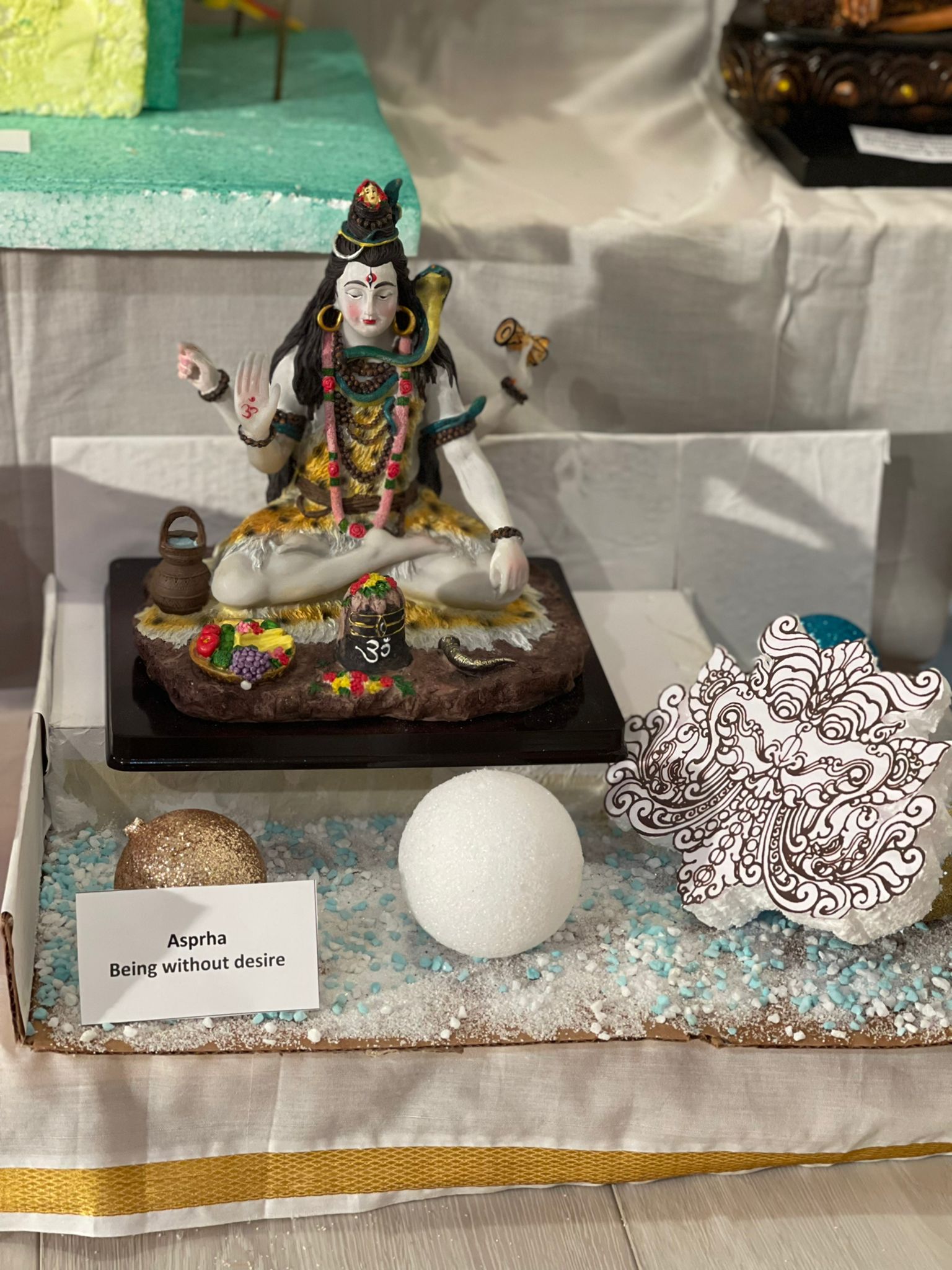
Uttama Bhakthi - Unalloyed devotional service
Story of Hanuman
Uttama-bhakti, pure devotional service, is the cultivation of activities that are meant exclusively towards the devotion to God, in other words, the uninterrupted flow of service to God, performed through all endeavors of body, mind, and speech, and through expression of various spiritual sentiments (bhavas). It is not covered by jnana (knowledge aimed at impersonal liberation) karma (reward-seeking activity), yoga or austerities; and it is completely free from all desires other than the aspiration to reach God.
Hanuman’s bhakthi towards Rama is not covered with jnana (knowledge aiming at impersonal liberation) or karma (fruitive activity). He never has any worldly desire. His only desire is to serve Lord Sri Rama. His activities therefore, are uttama-bhakti. He cannot forget Sri Rama for even a moment.
It is believed that wherever Rama nama japam or Rama Bhajan is in session, Hanuman shows up there to celebrate Rama.
Hanuman told Sita, Laksmana, Bharata and Satrughna, “Please give me any service. It may be a third class bogus service, but I want it.” They thought, and they discussed amongst each other, “What service can we give him?” “Nothing,” they decided. Then he said, “I have a suggestion. Sri Ramachandra has never yawned – but it may come. I will stay outside his room, and when He will yawn I will snap my fingers. This service should be given.” Snapping of fingers when a person yawns is a message to “take care” and to remember God. The four discussed Hanuman’s proposal and decided that, since in His whole life Ramachandra had never yawned, there would be no harm in Hanuman taking that service.
Hanuman remained sitting on the outside of the house. He sang, “Jaya Rama, Jaya Rama, Jaya Jaya Rama,” and snapped his fingers continuously. Lord Ramachandra then began to yawn – only yawning throughout the entire day and night – and all services by Sita, Laksmana, Bharata and Satrughna had to be stopped. They began thinking, “What to do now? This Hanuman is the cause of all this.” They went to Rama, and Rama advised them, “Oh, please give him service; otherwise he will not be able to remain alive.” Hanuman demonstrates that we all should try to be a servant to God and get his abundant blessings.
Once Hanuman saw Sita devi, whom he considered to be “Mother Sita,” when she was in the dressing-room and now she was placing sindu (vermilion) powder on the part of her hair. Hanuman said, “Mother, I was searching for you. What are you doing here? What is this red color, and why are you anointing your head with it?” She replied, “I am wearing this so that your Prabhu, my husband, will be always glorious, have a long life and always be happy. By this he will surely be benefited.”
Sita devi then left and Hanuman entered in the dressing-room. He took all the red powder, mixed it with oil, and colored himself from top to bottom. When he reached the assembly of Lord Rama, all those present laughed when they saw him.
Lord Rama asked him, “What have you done?” Hanuman replied, “Oh Prabhu, I have done this because, if by Mother Sita keeping a small amount of this reddish powder on her hair You will be happy and have a long life, then I should put it everywhere on my body.” This is how he serves Lord Rama.
Hanuman shows that he is a symbol of pure devotion.
